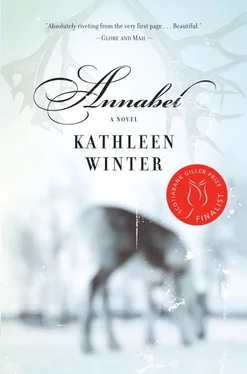“You want me to charge him for the electricity he uses listening to his record player?”
“He can start helping pay his own expenses. His books and clothes. He can put a bit on the household bills after Christmas. It’s the principle. It won’t hurt him one little bit. I might stay out longer this spring. I might do the whole spring hunt up the river. Now he’s older he can give you more of a hand.”
When Wayne brought home the school bill for his new chemistry book, Jacinta gave him the money but said, “Your father wanted me to ask you to pay for part of it.”
“Pay for my books?”
“He said keep half your money and give me the other half for books and clothes and the household.”
All his life Wayne had deferred to Treadway’s pronouncements, and he did so now. As far as he knew, other boys’ fathers gave them more money as they grew older, not less. Brent Shiwack’s father bought him an Arctic Cat, and Mark Thevenet’s dad was ordering Mark his own Sea-Doo, which cost more than a car. Wayne did not expect Treadway to act like the other fathers, and he didn’t protest. There was a restrained economy under Treadway’s roof, part self-denial and part moral exercise, and Wayne had been trained into it. There were things he wanted, but a Sea-Doo was not one of them.
“Do you need more money, Mom? The co-op is always after me for more cod ears.”
“Your father just wants you to be self-sufficient. It’s his way of—”
“It’s okay, Mom. I can get more money. Roland Shiwack wants me to work more hours. He doesn’t like giving work to Brent. I could make eighty-five a week easy right now.”
“You don’t have to make that much. Your school work—”
“I’m fine, Mom. My school work is fine.”
Wayne did extra work for Roland and his feet began to peel again, as they had done the summer before grade seven. He told Roland, who said it was because of the shrimp.
“That’s why I can’t do it myself. That and the fact it takes too long and I have a million other things to do. There’s a substance in there that causes my hands to peel red raw. Funny it affects your feet. I guess it migrates. Can I have a look?”
Wayne shoved off his sneaker. The skin on his soles had broken into sheets and curled at the edges. He peeled off a sheet of skin.
“That’s it. That exact same thing, only on my hands.”
“It doesn’t hurt.”
“My hands sure hurt.”
“Well, my feet don’t. But I’m glad to know the cause.”
Wayne had always associated his peeling feet with the day Thomasina rushed him to hospital. He had thought it had something to do with his swelling abdomen. This time, he had been afraid the whole thing was starting again.
“It’s a relief to know what it is. That it’ll pass when I get the shrimp done.”
“If you want to stop, I’ll certainly understand. I can get you to shave the ends of that pile of fenceposts instead.”
Jacinta did not tell Wayne that Treadway might stay all spring in the interior. She forced herself to peel potatoes, boil them, then cut and fry them with egg and moose sausage, the way she would have done for the three of them as a family. But when the doctor visits died down and November came, when the clocks turned back and nights grew long, she stayed up later at night. Wayne had to get himself up in the mornings in time for school. At first Jacinta dragged herself out of bed and made a family breakfast. Then she made easier things: toast and jam or peanut butter, and milk; then she let Wayne get his own breakfast. She woke at ten, then eleven, then noon.
She ate store-bought jam, bread, and tea. A boiled egg once in a while. Treadway had cut three months’ worth of wood junks into stove lengths. When it was gone, she used the bucksaw and cut a few lengths each day. One day Wayne came home and the stove was out, and after that he sawed enough wood on Saturday mornings to last the week. The household had always run, as did all households in the harbour, on stored supplies gathered in season and used economically over time. Now the house began to run in a fashion that Jacinta’s mother would have called hand-to-mouth. Wayne made toast and ate rabbit meat out of the jar. He washed his own shirts, pants, gym clothes, and underwear in the little machine on wheels, and he watched his mother become as unreachable as his father had been. One day he found her lying on the couch with something pink all over her face.
“What is that stuff?”
“Mashed strawberries. Out of the freezer.”
“Why is it on your face?”
“It softens your skin.”
There were more strawberries on the kitchen table. Later in the evening he watched as his mother poured Carnation milk on them and ate them. She did not watch television but sat in the chair in front of the set and crocheted cotton dishcloths: green and white, or blue and white. She did this night after night as Wayne conjugated avoir and deciphered his slide rule and worried about her. He worried that it was his fault his father went on the trapline earlier than other dads and came home later. He worried that Jacinta was sad because no matter what he did, he would never be a normal son. A son with two testicles, not one. A son whose father did not have to sell his dog to a man he didn’t like.
“Crochet,” Jacinta announced, “is like drawing. You have one line, and you can make it go anywhere. It doesn’t have to be a stupid dishcloth.”
“You said those dishcloths work better than J-Cloths.”
“I don’t need a hundred of them. If you know the basic stitch and a few variations, you can crochet any shape you want. You can crochet a rose, if you have a mind. That wild dog rose by the kitchen door? You can crochet the whole bush if you feel like it. All you have to do is make a chain of three, close it, and go around the ring and make a gathered petal in each stitch, using rows of half-double crochet.” There was yarn all over the house: rose, mustard, green.
“Can you crochet a cup and saucer?”
She studied a cup on the table. “I could try.” When Wayne laid his bookbag on the table the next day, she had done it.
“Can you crochet a horse’s head?”
“If I can figure out how to draw one.”
That school year she lined the shelves, the TV, windowsills, and armoire with replicas of razor-clam and mussel shells, a conch, a trout, a smelt, a salmon, seven sea urchins, three cups and saucers, and twenty-eight starfish. She loved starfish.
Jacinta used up her Briggs and Little wool, then went on to linen yarn and a kind of yarn made with silk and seaweed that she had been saving for booties for the next baby born in the cove. In Treadway’s shed she found his twine and made pots out of it. They stood on their own. She filled them with stones and pieces of juniper, and she crocheted tiny birds and perched them in the juniper. She crocheted a roll of snare wire into a bowl like bowls in the catalogue, into which people in big country homes put their brown eggs, and she bought eggs from Esther Shiwack to put in it. She began to crochet abstractions. A green and brown wool spiral fortified with snare wire. A blue river strung with beads. Extreme close-ups of leaves.
“I let the yarn talk to me,” she told Eliza Goudie on the phone. “I can’t explain all the shapes.” She stayed up all night and made more, and the shapes were not recognizable.
Had Jacinta been in a city this might have been all right. Someone might have understood what she was making. They might have bought one from her and hung it in the lobby of the Bank of Montreal. Wayne would think this later in his life. But at fourteen, fifteen, and sixteen he wished his mother would go back to starfish. His father lived outside the house longer than he lived in it. He brought home wood, caribou, salmon and smelt, and money from his furs. Before he left for the trapline or his cabin on Bear Island, he drove Wayne to Goose Bay for his medical check-ups. They stopped on the way for burgers and root beer at the A&W in Goose Bay, and agreed that a burger was no good without bacon. Treadway never asked how Jacinta fared in the months he was away. They discussed the beaver house at Thevenet’s Bend, thirty miles in; whether the beavers had vacated it or were in there, with steam coming out of the hole. Treadway gave Wayne beaver teeth when he could get them. The co-op paid two dollars a set, for necklaces. They discussed money, and Treadway made sure Wayne remembered how to find the key to his private box in case the family should need the gold while he was gone, or in case Wayne had to consult his checklist of medications, which Treadway kept under his will, which was under the gold.
Читать дальше












